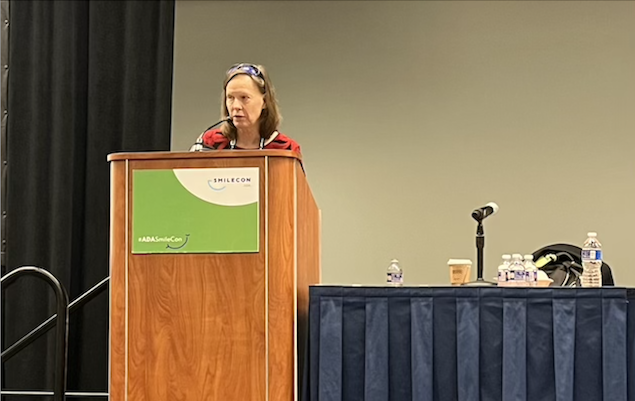The link between added sugars and oral health
SmileCon 2025 session explores evidence-based screening strategies

Dental professionals attended an Oct. 24 educational session during SmileCon 2025 that focused on how dietary choices — particularly added sugar intake — affect both oral health and overall systemic well-being.
The session, Dietary Counseling: The Intersection of Sugars and Oral Health, was presented by Teresa Marshall, Ph.D., professor in the Department of Preventive and Community Dentistry at the University of Iowa College of Dentistry. Dr. Marshall reviewed the scientific evidence linking diet quality, added sugars and their role in dental caries, periodontal disease and chronic systemic conditions such as obesity, cardiometabolic disease and cancer.
“Essentially, as one improves their diet quality, they have a reduced odds of periodontal disease,” Dr. Marshall said.
During the session, attendees learned how to define added sugars and identify how they impact diet quality, oral health and systemic health; describe chairside dietary screening and counseling strategies to reduce added sugar-related oral disease; and identify misinformation and sources of reliable information for patient education and counseling.
Dr. Marshall said in her presentation that research has consistently shown that frequent consumption of sugar-sweetened beverages contributes to the development of dental caries and periodontal disease, while also being associated with obesity and cardiometabolic disorders.
The session also reviewed evidence connecting high intakes of added sugars, alcohol and processed or red meats to increased cancer risk. These associations underscore the shared dietary pathways that influence both oral and systemic diseases, she said.
“Our high added sugars, our low nutrient intakes and our high sugar-sweetened beverages increase the risk of both oral and systemic disease,” she said. “When we are providing dietary consult for oral disease, it’s reinforcing systemic health messages.”
Attendees also learned how to apply the nutrition care process in their clinics. This process is a systematic approach involving screening, assessment and counseling, to incorporate dietary discussions into everyday dental practice. The first step, screening, involves identifying patients at risk based on marginal dietary habits, such as frequent consumption of sugar-sweetened beverages or poor adherence to MyPlate guidelines. The second step, assessment, involves reviewing social, medical and dietary histories, including medication and supplement use, recent changes in diet, meal patterns, and intake of fermentable carbohydrates. Finally, the counseling step includes developing and implementing plans to reduce sugar-sweetened beverage intake, limit food-based rewards and promote nutrient-dense meal patterns.
The session emphasized using patient-centered communication and referring for specialized dietary counseling when appropriate, and remembering to consider social determinants of health — conditions within one’s environment that impact health risks and outcomes. Dr. Marshall encouraged attendees to view dietary counseling as an essential part of preventive and community dentistry. By incorporating nutrition-focused discussions into routine care, dental teams can support patients in improving both their oral and overall health outcomes.
“You, as an oral health practitioner, have a responsibility to identify the barriers to healthy eating and act to support healthy eating,” Dr. Marshall said.



